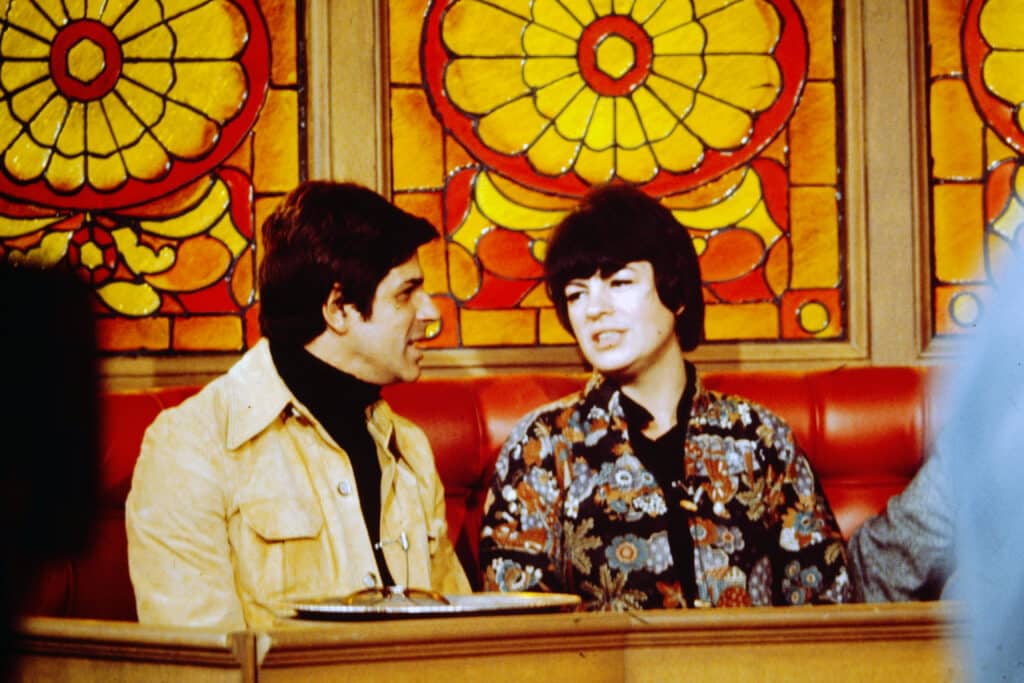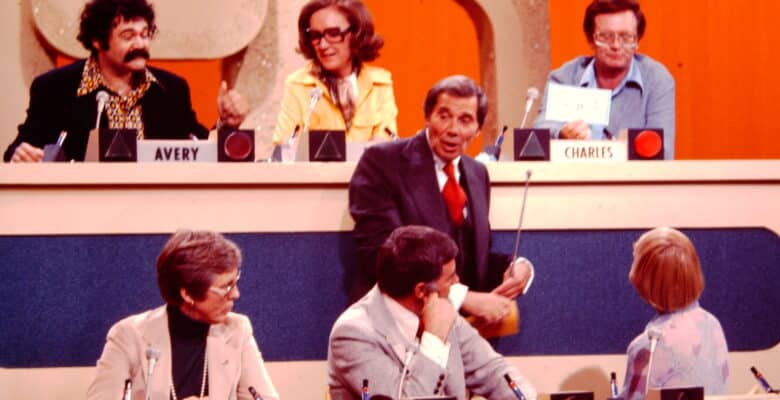By Adam Nedeff, researcher for the National Archives of Game Show History
“What’s in it for THEM?”
Have you ever watched Password, The $100,000 Pyramid, Match Game, or any other celebrity game shows and wondered why the celebrities are there? They can’t win the car, the cash, nor the washer/dryer combo, and with the workload involved for the TV shows on which they’re already appearing regularly as cast members, being on a game show is costing them a precious day off. A few celebrities have explained the incentives for being on a game show over the years…

IT HELPS NAME RECOGNITION—Actors often find themselves disappearing into the characters they play; when they’re recognized in public, fans address them by character names, not their real names. Game shows helped establish an identity beyond their characters.
Dick Gautier (Hymie the Robot on Get Smart, among many other roles) explained in 2013, “You were visible, the host said your name…and in my case, pronounced it correctly, which was a big plus…And the audience saw you for five straight days.”
Jamie Farr, who began appearing on game shows during the height of the popularity of M*A*S*H, said, “Before I started doing game shows, if people recognized me on the street, they would say, ‘Hey, it’s Klinger! It’s Klinger!’ After I began appearing on game shows, they began saying ‘Hey, it’s Jamie Farr!’”
IT CAN LEAD TO OTHER GIGS—In a 1962 TV Guide profile of the stars who frequently appeared as game show panelists, Betsy Palmer, a regular on I’ve Got a Secret, explained what had happened in her theatrical career since she started appearing on game shows.
“Panel shows have made me what I am today…When I played Columbus (Ohio) in Gentlemen Prefer Blondes last summer, we filled the auditorium to capacity—4,000 seats every night. They shouldn’t pay us for being on Secret. We should pay them.” Random House founding publisher Bennett Cerf, who amassed a full schedule of paid speaking engagements because of his weekly appearances on What’s My Line?, told TV Guide, “I’ll deny it if you print it, but I would do [game shows] for nothing.”
Possibly the definitive example of what game shows can do for a career was Burt Reynolds, who traced his two decades of film superstardom to an appearance on a game show. Reynolds, who was playing the title role on TV’s Dan August, appeared on The Hollywood Squares to promote that show. A talent booker for The Tonight Show Starring Johnny Carson found Reynolds witty and engaging in his Squares appearance and extended an invitation for Reynolds to appear as a guest of Carson. A casting director saw Reynold’s appearance on The Tonight Show and thought Reynolds would be perfect for a film that was about to start production; that film was Deliverance. The success of the film sent Reynolds into the stratosphere. At a time when many A-listers shied away from game shows, Reynolds famously harbored a sense of loyalty toward the genre, popping up on Match Game, Password, and even surprising the audience by modeling a new car on The Price is Right.
IT’S JUST PLAIN FUN—Charles Nelson Reilly famously said of Match Game, “This isn’t a job, it’s a social engagement.” A six-episode taping day on that show involved catered lunch and drinks after taping the second episode, catered dinner and more drinks after the fourth episode, and a chance to swap stories and jokes with the other stars. And during all that, you were asked to play an uncomplicated game that didn’t require memorizing a script or any rehearsals. You just waltzed right in and played the game. And for all that, you’d collect a few thousand dollars for your time.
Some truly loved the games. Betty White said she thought the mental exercise involved was good for her. Chuck Conners was so addicted to Password that he offered to pay for his own travel arrangements to appear on the show.
Shelley Herman, a longtime writer for TV game shows, says, “Actress Debralee Scott told me the proudest moment of her career was when she scored 234 points and became the first celebrity who won Fast Money without her partner’s help on Richard Dawson’s version of Family Feud.”
GOTTA PAY THE BILLS—While the general public thinks of actors as multimillionaires across the board, the truth is a great many performers in the public eye are thinking about getting their rent paid like the rest of us. David Narz, who designed the stunts for All-Star Beat the Clock, remembers, “Celebrities are like any other people—some of them are comfortable doing silly stunts. Some of them aren’t. And the ones who aren’t end up doing the show because they need a gig, they need exposure. So, we had some weeks where we already had a host who wasn’t that fond of the show, playing the game with some celebrities who didn’t want to be there.”
“I remember a taping of All-Star Beat the Clock where the celebrities were behind the curtain waiting to be introduced. One of them was an actress that I won’t identify. But she was there because her agent booked her on the show. And I remember she just looked at me and said, ‘Tell me who I need to talk to and what I have to do with him in order to get out of doing this show.’”
Bill Bixby, who found employment difficult to come by in the years between My Favorite Martian and The Courtship of Eddie’s Father, once credited his appearances on The Hollywood Squares with keeping him above water during those lean times.
Shelley Herman tells us, “While the syndicated game show Liars Club gave up-and-coming talent, including David Letterman, some of their first national television exposure, executive producer Larry Hovis, best remembered as Lieutenant Carter on the ‘60s comedy series Hogan’s Heroes had a soft spot in his heart when hiring celebrity panelists. He often got phone calls from actors, some of whom were close friends, who confided in Hovis that they needed just one more job to qualify for their health insurance benefits from the union [AFTRA, now SAG-AFTRA, paid health insurance benefits based on how much work you had done in television during the past year]. Hovis could empathize with his fellow performers.”
PLANNING FOR THE FUTURE—There’s one other union benefit to keep in mind: the pension plan. Jamie Farr explained in a 2019 interview, “AFTRA determines what kind of pension you qualify for by the amount of work you do on radio and television. I did so many appearances on game shows that it pushed me over the line, and I became eligible for a huge pension.”
Bill Cullen, as prolific a game show panelist as he was a host, was said to have “maxed out” the pension plan because of the sheer volume of his work. He and his wife Ann enjoyed a very comfortable life-after-television thanks to his thousands of game show episodes.
But our favorite answer to the question, “Why do game shows?” came from actress/comedienne Jo Anne Worley, who said this in 2019: “”I’ll tell you why I loved doing game shows so much. A week ago, a woman recognized me and she comes up to me and says ‘You don’t know me. You were my husband’s partner when he was on The $25,000 Pyramid. He paid for college with that show. Thanks for helping him.’ I got to help people by doing game shows. And they paid me a few thousand dollars per shot for doing it. And they paid for my lunch while I was in the studio. I don’t think you could ask for a better job than being on a game show.”
DO YOU REMEMBER…THESE OTHER CLASSIC GAME SHOW GUEST STARS?
NIPSEY RUSSELL—Born Julius but nicknamed “Nipsey” by his mother, Russell was a maverick stand-up comic who refused to do stereotypical comedy in his early career, insisting on wearing stylish suits and doing jokes mocking racism at a time when neither was common for black comedians. Russell’s way with rhyming phrases earned him the nickname “the poet laureate of television.”
CHARLEY WEAVER—Cliff Arquette was an accomplished actor who performed as “Charley Weaver,” an old hayseed, for a skit on Jack Paar’s Tonight Show. The skit was so popular that Arquette virtually never appeared on television as himself again. The character took on a life of its own in a manner similar to Elvira or Pee-Wee Herman in later years. Weaver was a fixture on the original Hollywood Squares from its launch in 1966 through Arquette’s death in 1974
FANNIE FLAGG—Patricia Neal of Alabama decided to pursue a career in comedy. Because there was already a famous actress by that name, she stitched together her alias from comic actress Fannie Brice, and Lily Flagg, an Alabama town named after a cow. She became a fixture on Match Game. A fan wrote her a letter observing that Fannie must be dyslexic because of the odd way that she spelled some of her answers. Flagg, who had never heard of dyslexia prior to reading the letter, got a life-changing diagnosis and ended up pursuing a new career as an author. Her best-known work was Fried Green Tomatoes.



